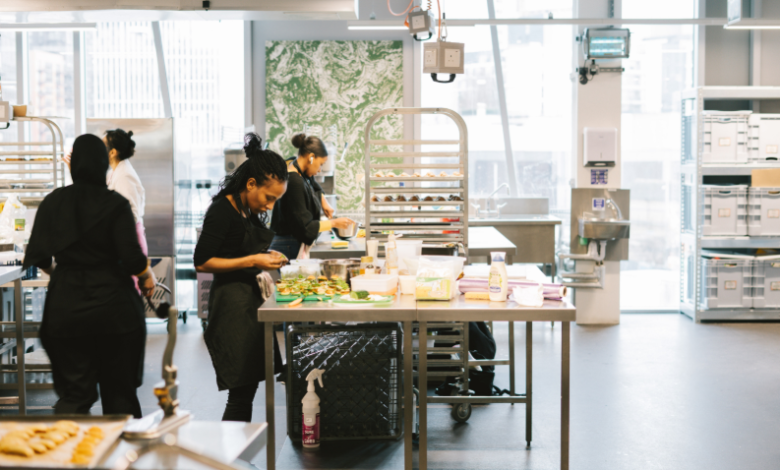Cloud Kitchen Rental In Food Industry

Understanding The Concept Of Cloud Kitchen Rental
In the modern era of food delivery and online ordering, the concept of cloud kitchens has reshaped the food and beverage landscape. A cloud kitchen rental refers to a commercial cooking space that allows food entrepreneurs, restaurants, or delivery-only brands to prepare meals without a dine-in facility. These kitchens are equipped with all necessary amenities and are available for rent on flexible terms. This model is increasingly gaining popularity due to its cost-efficiency, scalability, and operational flexibility.
Benefits Of Renting A Cloud Kitchen
Renting a cloud kitchen comes with numerous advantages, particularly for start-ups and small-scale food brands. The primary benefit is the significant reduction in overhead costs. Since there’s no need for dining space or front-end staff, businesses can allocate their budgets toward food quality, packaging, and marketing. Additionally, many cloud kitchens offer ready-to-use spaces with essential licenses and equipment, speeding up the time to market.
For food businesses aiming to expand into new locations, cloud kitchen rental provides a low-risk approach. Instead of investing in an entire outlet, entrepreneurs can test the market in a specific area with minimum investment. Furthermore, shared utilities such as dishwashing, inventory storage, and security reduce operational burdens.
How Cloud Kitchen Rental Supports Food Startups
Food startups often struggle with high setup costs and regulatory challenges. A cloud kitchen rental helps mitigate these issues by offering a plug-and-play solution. Most kitchen providers assist with obtaining health and safety certifications, which simplifies the compliance process. In addition, they often offer tech integration to streamline order management and delivery operations.
Many rental kitchens are located strategically in high-demand delivery zones. This positioning increases visibility on food delivery apps and reduces delivery time, enhancing customer satisfaction. For startups, quicker delivery often means higher ratings, better retention, and repeat orders, which are essential for growth.
Challenges In Cloud Kitchen Rental
Despite its benefits, there are some challenges associated with cloud kitchen rental. One of the major issues is limited branding. Without a physical storefront, food businesses must rely heavily on online marketing and customer reviews to build recognition. This can be difficult for new players in a competitive space.
Another concern is dependency on third-party aggregators like food delivery platforms. These platforms take commissions on every sale, which may reduce profit margins. Also, since multiple brands operate from the same location, competition can be intense within the shared space.
Operational challenges may include time slot restrictions, equipment sharing conflicts, and hygiene inconsistencies if the rental kitchen management does not maintain high standards. Therefore, selecting the right kitchen partner is crucial for sustained success.
Key Considerations Before Renting A Cloud Kitchen
Before choosing a cloud kitchen rental, food business owners must evaluate several factors. First is the location. It should be close to the target customer base to ensure timely deliveries. Secondly, the rental pricing model must align with the business budget. Some providers charge fixed monthly rent, while others operate on a commission basis.
Kitchen infrastructure is another critical consideration. The space must have essential cooking equipment, storage facilities, fire safety measures, and proper ventilation. Also, check for internet connectivity, surveillance, and delivery rider access.
It is also advisable to understand the terms cloud kitchen rental of lease agreements. Some kitchens offer hourly or monthly rentals, while others require long-term contracts. Flexibility is essential, especially for startups still exploring their market.
See also: Electricians in Telford: Powering Homes and Businesses with Excellence
Trends Shaping The Cloud Kitchen Rental Market
The food delivery industry has witnessed exponential growth in recent years. This has created a strong demand for cloud kitchen rental spaces. One key trend is the rise of virtual brands—businesses that operate entirely online from within a rented kitchen. These brands target niche audiences with specialized menus such as vegan, keto, or regional foods.
Another trend is the emergence of multi-brand kitchens. Some entrepreneurs run several brands from the same kitchen space, optimizing operational costs and increasing profits. Additionally, technology integration is playing a crucial role. Smart kitchens with automated order management, inventory tracking, and AI-powered cooking systems are becoming the norm.
Sustainability is also influencing the cloud kitchen rental model. Kitchens that promote eco-friendly packaging, efficient waste disposal, and energy-saving appliances attract more tenants and customers.
Cost Comparison With Traditional Restaurant Setup
Setting up a traditional dine-in restaurant involves expenses like renting a prime location, hiring large staff, interior décor, and utilities. In contrast, a cloud kitchen rental model bypasses many of these costs. On average, setting up a traditional restaurant can cost up to five times more than renting a cloud kitchen.
Maintenance and daily operations are also cheaper in a cloud kitchen. There’s less wastage, lower electricity bills, and fewer staffing needs. For new brands with limited funding, renting a kitchen provides a financially viable alternative without compromising on food quality or service.
Role Of Technology In Cloud Kitchen Rental
Technology is the backbone of successful cloud kitchens. Online ordering systems, delivery tracking, and point-of-sale software allow seamless management of daily operations. Most kitchen rental platforms offer integrated dashboards where food businesses can manage inventory, monitor order performance, and even forecast demand.
Cloud kitchen operators also collaborate with food delivery apps and provide back-end support to enhance order flow and customer experience. Features such as real-time reporting and data analytics help brands make informed decisions and optimize their marketing strategies.
Who Should Consider Cloud Kitchen Rental
Cloud kitchen rental is suitable for various types of food businesses. New entrepreneurs looking to enter the market with low investment find it ideal. Established restaurants wanting to test a new concept or menu can do so with minimal risk. Additionally, caterers, bakers, and dessert brands can expand their reach without building a new physical store.
International food chains also use cloud kitchens to penetrate new regions before launching flagship outlets. This helps them gather consumer insights and understand local preferences without heavy spending.
Future Outlook Of Cloud Kitchen Rentals
As consumer preferences shift more toward online food ordering, the demand for cloud kitchen rental will continue to grow. The model offers an innovative and flexible way for food businesses to operate in a digital-first world. With technological advancements, better infrastructure, and growing acceptance among consumers, cloud kitchens are likely to become the backbone of the food delivery industry.
Moreover, as investors and food tech companies continue to pour capital into this space, rental kitchens will become even more accessible and affordable. For entrepreneurs seeking a scalable, efficient, and low-cost entry into the food industry, cloud kitchen rental is undeniably a game-changing opportunity.






